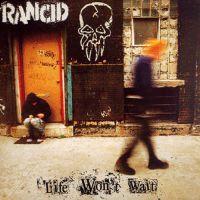…And Out Comes the Wolves is to Life Won’t Wait as London Calling is to Sandinista!
This is a common and generally accurate description of Rancid’s mid-90s progression. Following their critical and commercial darling, Rancid looked outside their bubble for inspiration. The recording of Life Won’t Wait took place all over the US but also saw the band venturing to Jamaica. Basically, Rancid was getting more popular and took it upon themselves to attempt something exploratory and new. Rancid didn’t go full Sandinista! — The Clash triple LP runs 2 hours — but at an hour-plus, the record feels long, crammed with too many ideas.
Life Won’t Wait seemed to return to business as usual, jumping into “Bloodclot,” the song most commonly still found on the Rancid setlist. It was traditional fare — Tim Armstrong’s snarl, Matt Freeman’s mind-blowing bass-playing. But then “Hoover Street” slowed things down, reflecting the new sound. Over the course of the twenty-two tracks, ideas flowed fast and lose. There was old school Rancid (“Black Lung,” “The Wolf”). There were political numbers (“New Dress,” “Warsaw”). There was one great love song (“Who Would’ve Thought”). And most notably, there were two remaining tracks from the Jamaica sessions, “Hoover Street” and the title track. "Life Won't Wait" featured Jamaican artist Buju Banton and hints at what a full album like this could have sounded like. Instead the reggae and ska influence spread itself thinly over the whole album.
Life Won’t Wait suffered from length and the ‘something for everyone’ mentality meant a lack of unity. The filler here is often good yet still miles removed from their best work. Depending on your preferred form of Rancid, the filler tracks differ. But as much as one may enjoy “Turntable,” “Cash, Culture and Violence,” or “Cocktails,” it’s not hard to imagine a record without them.
“Corazon De Oro” and “Coppers” closed the album, the former an excellent song (worthy of a NOFX cover) and the latter, a perfect summation of the whole experience. “Coppers” ran five minutes with Tim and Lars splitting vocals with reggae artist Dr. Israel. The dancehall and gruff vocals come together and the hook of, “London you gonna find them, New York, LA back to Kingston - All I see is youth fightin’” seem to encompass what this record was at its core: an attempt at reggae by a band defined by their old school punk rock nature.
While not as timeless as its predecessor, the Life Won’t Wait sessions had just as dramatic an impact on Rancid. Armstrong, in particular, wore these influences on his sleeve before and definitely after (see A Poet’s Life) the album. Life Won’t Wait was where Rancid tried to go out on a limb. And it made total sense why Rancid felt the need to follow it up with the hardcore Rancid (2000). While they’ve never made another album this far removed from their comfort zone, Life Won’t Wait is a good album that helped steer the band back to a style they’ve maintained for the last twenty years.
